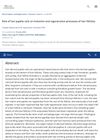TLDR Eating isoflavone can help mice grow hair by increasing a growth factor.
In the study from 2011, researchers found that dietary isoflavone increased insulin-like growth factor-I (IGF-I) production, which in turn promoted hair growth in wild-type (WT) mice. Isoflavone significantly raised CGRP mRNA levels in dorsal root ganglion neurons and IGF-I production in the skin of WT mice, leading to enhanced hair follicle morphogenesis, hair regrowth, and pigmentation. These effects were not observed in CGRP-knockout (CGRP-/-) mice, indicating the importance of CGRP in the process. The study concluded that isoflavones could promote hair growth by increasing IGF-I production in hair follicle dermal papilla cells via the increase of CGRP production in sensory neurons. The number of mice used in each experimental group was five.
450 citations
,
January 2005 in “The journal of investigative dermatology/Journal of investigative dermatology” Hair color is determined by melanin produced and transferred in hair follicles.
 49 citations
,
August 2003 in “Journal of The American Academy of Dermatology”
49 citations
,
August 2003 in “Journal of The American Academy of Dermatology” Higher IGF-1 levels in hair follicles link to better finasteride results for hair loss.
112 citations
,
February 2001 in “Journal of Investigative Dermatology” Neuropeptides affect hair growth, with some speeding it up and others slowing it down.
98 citations
,
November 1999 in “Dermatology Online Journal” IGF-1 can boost hair growth by promoting cell growth and preventing cell death.
147 citations
,
April 1997 in “Oncogene” Overexpressing IGF-1 in mice leads to skin abnormalities and tumors.
 101 citations
,
January 1997 in “Journal of Investigative Dermatology Symposium Proceedings”
101 citations
,
January 1997 in “Journal of Investigative Dermatology Symposium Proceedings” Nerves and chemicals in the body can affect hair growth and loss.
 210 citations
,
July 1993 in “The journal of investigative dermatology/Journal of investigative dermatology”
210 citations
,
July 1993 in “The journal of investigative dermatology/Journal of investigative dermatology” Hair color production in mice is closely linked to the hair growth phase and may also influence hair growth itself.
 321 citations
,
December 2009 in “Journal of Dermatological Science”
321 citations
,
December 2009 in “Journal of Dermatological Science” Dermal cells are key in controlling hair growth and could potentially be used in hair loss treatments, but more research is needed to improve hair regeneration methods.
January 2003 in “Chinese Journal of Reparative and Reconstructive Surgery” Dermal papilla cells can help form hair follicles and produce hair.
 66 citations
,
August 2001 in “Experimental Dermatology”
66 citations
,
August 2001 in “Experimental Dermatology” Human hair follicle cells can grow hair when put into mouse skin if they stay in contact with mouse cells.
 57 citations
,
November 1998 in “Wound Repair and Regeneration”
57 citations
,
November 1998 in “Wound Repair and Regeneration” Hair papilla cells can create and regenerate hair bulbs under the right conditions.






